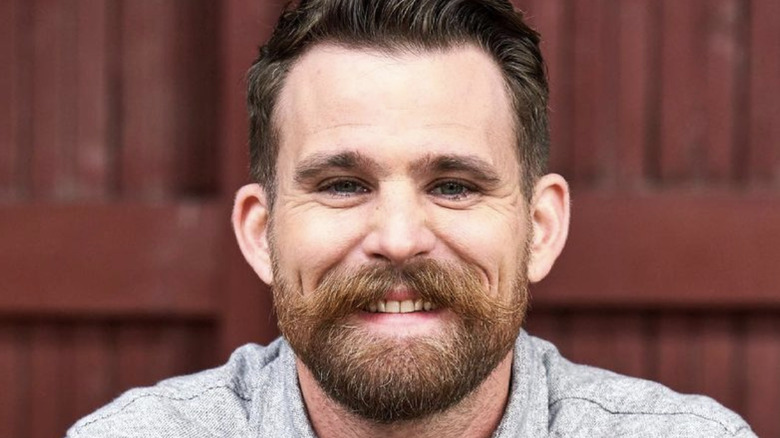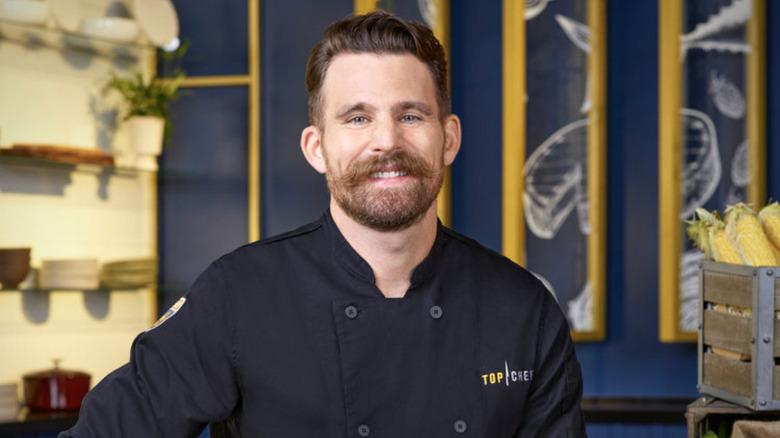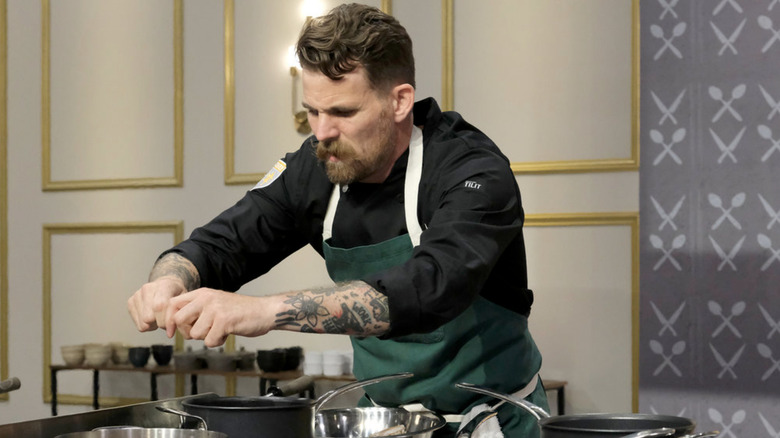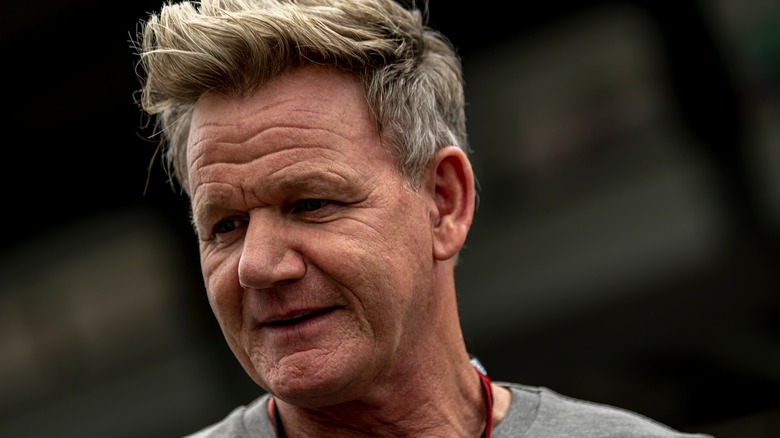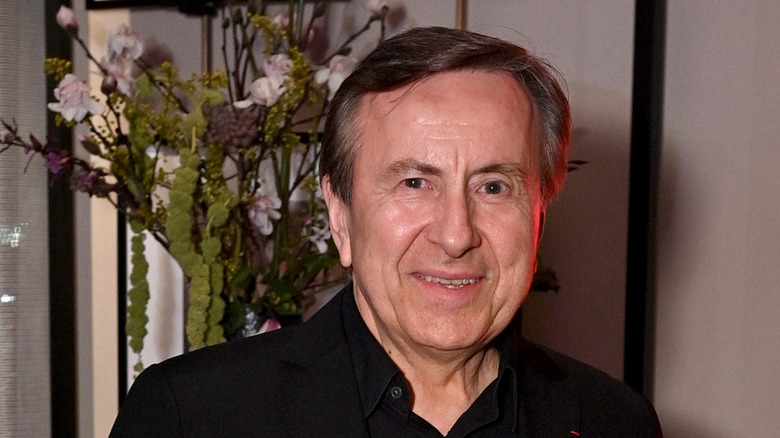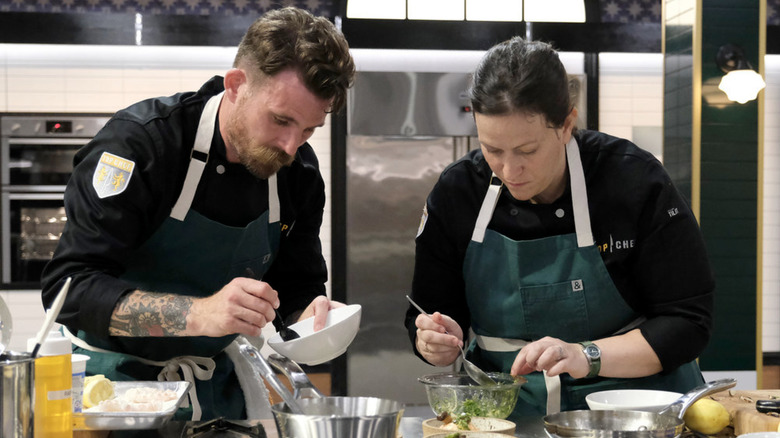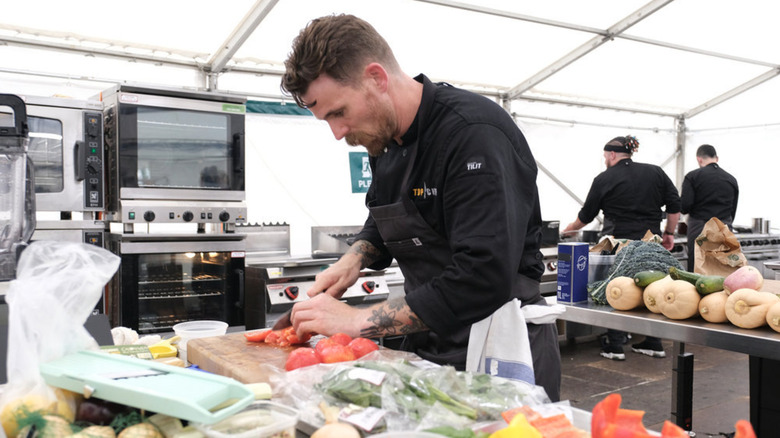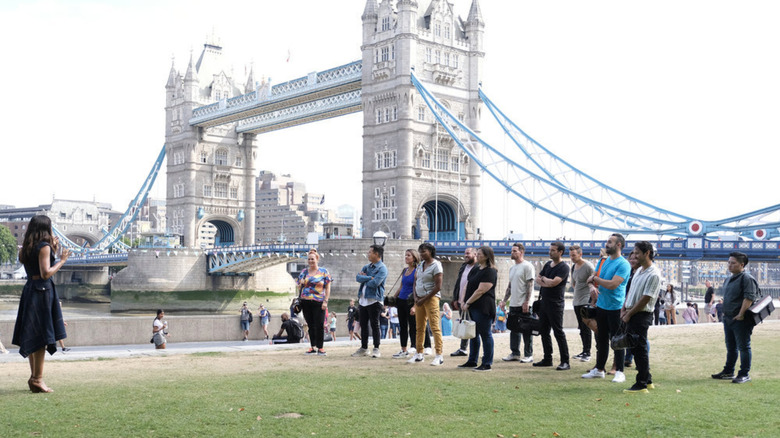Top Chef Winner Dale MacKay Explained His Food Philosophy And Prepping For World All-Stars - Exclusive Interview
Chef Dale MacKay was already a seasoned professional by the time he won the first season of "Top Chef: Canada." He'd cooked in fine dining kitchens under luminaries like Gordon Ramsay and Daniel Boulud, learning the ins and outs of the kitchen from masters of the craft around the world. After running kitchens as a head chef for those culinary titans, MacKay's "Top Chef" win allowed him to go into business for himself. When it came time to start up his own restaurant group, MacKay left his globetrotting ways behind him and started opening eateries in the Canadian province of Saskatchewan, which is where he grew up. Now, MacKay has a second chance at capturing "Top Chef" glory by competing against fellow champions from around the world in "Top Chef: World All-Stars."
In our interview with the chef, father, and amateur aviator, we talked about what makes the Saskatchewan food scene special, his culinary philosophy, and what he's looking forward to in the new season of "Top Chef." Of course, we got a good Gordon Ramsay story out of him as well. After reading our conversation, you'll be just as excited as we are to watch MacKay compete for the "World All-Stars" crown.
The food scene in Saskatchewan
Before we get into the show, I'm curious to talk about the food scene in Saskatchewan. Very broadly, how would you characterize the food scene there?
It's small cities there. The scene has grown tremendously in the last 10 years; we feel like our restaurant group had a lot to do with that in the sense of independent restaurants. Before, Saskatoon was always super high on the list of how many restaurants per capita in Canada, but it was always chain restaurants or mostly Greek restaurants. It's a good scene here because there are passionate people, and we have very good products — great meat, great fish, great vegetables, [and] some of the best mushrooms in the world. So [the food scene] is growing and it's good.
You've cooked all over the world but eventually returned home. What inspired you to come back to where you grew up?
I left Saskatoon on my 15th birthday — I just bought a one-way ticket and left. After working abroad for about 10 years, I wanted to come back and show Saskatchewan what I'd learned. It was soon after I won "Top Chef Canada," so it seemed like a good time to go back home. But the overall reason was my son. I've been a single father to him since he was about 4, so I wanted him to have the same upbringing that I did. We were living in Vancouver — in Kitsilano — which is nice, but it's not "jump on your bike and cruise down to the river with your buddies" nice. We moved here, and now he's turning 21 in March and going to Europe in April to travel for six months.
Wow, that's exciting. Are there any traditional foods that you can remember eating when you grew up?
Everybody here, if you grew up in Saskatoon or in Saskatchewan, you almost feel like you're Ukrainian or Polish by association. [At] Christmastime here, I could go from house to house from Ukrainian Christmas to regular Christmas. The food culture here is heavily influenced by Eastern European food — pierogies, sausages. The food style is similar, but it's pretty meat and potatoes. I don't know if there's anything specific. There are some baked goods and stuff that we claim are ours, but for the most part, it's your Eastern European food.
Dale MacKay's culinary philosophy
I noticed that your restaurant group has several Asian-inspired places and one Italian place. What is the inspiration for your culinary point of view?
I've been lucky. I have gotten to work in so many places around the world. I worked in London for numerous years; I worked in Japan for almost three years. Thai food is probably my favorite food in the world to eat. I love Chinese food — I love the flavors. Then my business partner's Korean, and we've been partners for 15 years now. His wife is Korean as well, so I love Japanese food and Korean food. I've actually worked in Korea for about four months.
It was something that we love to eat, so we always try to do things that we love to do, which are Korean food and Japanese food. Also, we're in small cities, so we don't want to keep doing the same thing over and over and keep giving people the same thing. That's where the Asian side of things comes from.
Even in the not-necessarily Japanese or Korean restaurants, we use a lot of flavors from everywhere. We don't limit ourselves to French or European. The Italian restaurant is straight Italian because I love fresh pasta. I love making fresh pasta. It's such a nice little restaurant — it's only 30 seats, it's called Little Grouse on the Prairie, named after the show, and that's our provincial bird. It's about good pasta and feeling like you're in grandma's kitchen, if you had an Italian grandma.
Making a first impression with Gordon Ramsay
You worked under Gordon Ramsay for a while. Do you have a Gordon Ramsay story from those years?
I've got lots of Gordon Ramsay stories. I don't know if we can actually say many of them, but yes. The nice thing ... When I joined him, it was in 2000, so it was when he just had one restaurant. I got in there when I opened his second restaurant, and I opened his third restaurant and opened his fourth. I became an opener for him. Every time we'd open something new, I would go there for four months or six months to help set it up and stuff. Then I moved to Japan for him, and I moved to New York for him. I was with him for a long time.
He's such an interesting person, and especially when I joined him, he was still in the kitchen every day. It wasn't like you just heard about Gordon. He was in my face every day for the first couple of years and beyond. But the first time I ever met him ... Back then, you'd always call the chef "chef" — you would never say their name. It was always "chef, chef, chef," everything.
He was the rare case in that he didn't like being called "chef" — it was always Gordon. It is something I adopted from him that none of my cooks ever called me "chef." It's always Dale. I was so worried about meeting him, and someone introduced me as, "This is Dale, he's from Canada." I said, "Hey, Chef." I kept saying "chef," and he's like, "Stop calling me 'chef.'" I said, "Okay, Chef." He's like, "You call me 'chef' one more time, you'll be cooking staff food for the next month."
I literally went to sauté station and said, "Thanks, Gordon." Then when he was leaving, he's like, "Nice to meet you." I said, "You too, Chef." Then I did it one more time and he looked at me. I couldn't get it out of my head. That's probably the cutest story I can tell about him.
Daniel Boulud's lessons in hospitality
I can imagine you were on the receiving end of his temper a fair bit. Are there any lessons you took away from working under Daniel Boulud?
Daniel — in my opinion — [is] the number one chef in the world, hands down. He's the king of concepts. He's got so many great levels of concept, and the thing with Daniel is that everything is class. He's got class all the way through, whether it be casual or all the way top-of-the-line, and it's true hospitality. Gordon taught me to cook with balls and aggression, whereas Daniel was almost like a finishing school where you're learning about hospitality.
One of the first times I was ever at an event with him, there was a woman 10 feet away, and she had a canapé and didn't have anywhere to put her napkin. He stopped a conversation, walked all the way over there, and grabbed her napkin from her because he could tell she didn't know what to do with it.
He truly thinks about hospitality. He doesn't think about himself. He thinks about the overlying group and what's best for it. I learned a lot from him when it comes to actual hospitality — it's not about you, it's about the guest.
Scoping out the Top Chef competition and judges
Moving to the show, have you ever cooked for any of the American "Top Chef" judges before? Do you have anyone you're particularly excited or intimidated to serve?
Not so much intimidated — well, Gail Simmons, [whom] I've always been a big fan of, but she was on my season of "Top Chef: Canada," and she's Canadian. I have met her and she has judged my food before. I try not to think about it necessarily. You need to play to the judges and be smart, play the game. But you can't get wrapped up in who's judging your food, because then you start letting little voices into your head and making bad decisions, or maybe the decisions you wouldn't normally make. I try not to think about who's judging me and just cook the food that I would cook for a guest or for a judge.
Have you scoped out the competition and identified anyone you think is a big threat?
The uniqueness of "World All-Stars" is the fact that everyone's going to be very good. Generally, when you're going on a season of "Top Chef," no matter what country you're in, you're going to expect some people that are going to be coming in overconfident or some people that think that they are something, but maybe they're not quite at the level that everyone else is. There are always going to be a couple of people that don't do that well. But when you're going to do something like this, everybody has already been proven completely in their own regard, whether they're a winner or they've done very, very well, or they've done the show multiple times. You can't bet on someone not being that good. Most are going to be pretty strong.
That's what excited me the most about doing it: It was to go against all these great chefs. The fact that you've got chefs from all over the world this time is going to be amazing, because of the fact that generally — in each respective country — they're going to be cooking what food is being cooked in that country, but now you've got all these countries coming to cook against each other. You're going to have true Mexican food; you're going to have true Polish food or Canadian food or whatever you want to call it. You're going to see a lot of different food this time around.
How to prepare for competing on Top Chef
There's one other Canadian contestant, Nicole Gomes. Have you worked with her before? Are you familiar with her work?
I know Nicole really well. We've competed with and against each other, and I've had her in my restaurant numerous times to do dinners together. We've been to tons of events together, so we text quite often and stuff. Definitely, I was glad to see her there.
In what way is cooking for the competition different from cooking in a restaurant? Is there any training that you do to get into competition form?
Yes ... I was the winner of Season 1 of "Top Chef: Canada," so I won my season 11 years ago, which is quite a long time in restaurant terms and in career terms. I was a very different chef and person when I won "Top Chef: Canada," and my day-to-day is very different than it used to be. Back then, I was the chef for Daniel, and I was just doing fine dining. I had a 40-seat restaurant, that's it — that's all I ever thought about — whereas now I have five restaurants, and I have a head chef in each restaurant. I'm an entrepreneur as much as I am a chef, so my time spent in the kitchen is greatly diminished in the day-to-day.
Getting back in the kitchen was the biggest thing, and every day trying things that could come up, might come up, or things that you want to try to showcase. But "Top Chef" is a tough competition. The reason why it's so tough is that you rarely ever get to cook what you want to cook. It's only the finale, usually, where you get to go, "I want to cook this dish." You've got to try to work on covering your bases and making sure that you haven't left things to chance. If you haven't cooked a piece of lamb in eight years, you should probably cook a piece of lamb before you go.
Why England produces some of the best ingredients in the world
This season is being filmed in London. Do you have any favorite British foods or things you're excited to eat over there?
There are tons of British foods I like, but it's more the products. For whatever reason, England or the U.K. doesn't seem to get recognition for how many great products they have, but there are so many amazing fish. They raise some of the best lamb in the world; they have great butchers. It's some of the only places you can get great cuts like sweetbreads and all that stuff available.
Scotland has the best game in the world, the best langoustine [and] scallops, so it really is endless. They're great vegetable growers as well, so I'm probably more excited to work with the products again and be in London. London's where I learned how to cook, and it's where I moved to when I was a cook that just had dreams, so I built a lot of my dreams in that city. It was definitely super exciting to hear that it was going to be there.
What do you think it is about England that they put out such good products? Do you think it's pride or attention to detail or tradition?
It's probably tradition, a lot of it. Naturally, again, [in] Scotland, a lot of their waters are very cold and untouched, and they have a good variety of seafood. Then, being so close to the other European countries — even France and all that stuff — the ability to get anything you want and have it be good quality and quick is there. But there's always been amazing vegetable growers, especially celeriac and beetroots and those kinds of things. The lamb is the best. The Welsh lamb is amazing.
You're working on your pilot's license right now. Do you think there are any skills from the kitchen that translate to being up in the air?
Critical thinking is a lot of it. I like pressure and that kind of stuff, especially when you have to use your physicality and mental power. There's a little bit of math; there's a little bit of situational stuff and stress. I always yearn for those kinds of situations, and maybe that's why the pilot thing is so appealing, because it really puts pressure on you — you better know what you're doing.
Bravo's "Top Chef" returns for Season 20 with the "World All-Stars" edition on Thursday, March 9, at 9:00 pm ET/PT.
This interview has been edited for clarity.
